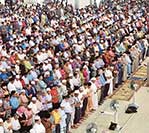LIFELONG PROCESS: The greater struggle lies in educating ourselves not just about personal religious rituals but equally about the community and environment we live in
LAST Friday, the Institute of Strategic and International Studies (ISIS) Malaysia capped its International Affairs Forum series for 2014 by hosting the ambassador of the United Arab Emirates to Russia, Omar Saif Ghobash for a talk on “Where is the moderate Muslim?”. The choice of the speaker seemed unusual but as pop economics has helped explain elsewhere, outliers can offer a stimulating if not provocative perspective relative to the norm.
The talk was described as “refreshing” by a number of those in attendance not because Ambassador Ghobash’s views were mind-blowingly new, but because he articulated what the silent majority is often cowed into not saying. If anything, the talk was refreshing for the hard, introspective questions it asked of Muslims and the Arab community; the candour and civility of the exchange that followed; as well as the measured and eloquent delivery of those remarks absent the banal platitudes or emotive rhetoric that typically accompanies discussions on Muslims and extremism.
The uncomfortable truth is this. While the global Muslim population may be bulging at the youth, it is not necessarily being adequately educated in terms of basic literacy, let alone holistically in the arts and (rather than, or) sciences. This, despite the fact that the first commandment revealed to the Prophet Muhammad (pbuh) was to “read”. Quoting statistics by the Islamic Educational, Scientific and Cultural Organisation (Isesco) and speaking at this year’s World Islamic Economic Forum, Prime Minister Datuk Seri Najib Razak himself voiced concern about the illiteracy rates which reach a shocking 40 per cent for men and 65 per cent for women in some Muslim countries.
An illiterate and uneducated (the two are not necessarily the same) populace paves the way for a lowly-employed, if not unemployed, and maladjusted society. This is bad enough news for youths struggling with existential questions in an increasingly fast-moving world but even worse in a conflict-prone environment. If estimates by the likes of Pew Research’s Religion and Public Life Project prove accurate, and the Muslim population grows by about 35 per cent to 2.2 billion by 2030, constituting slightly over ¼ of the world’s projected 8.3 billion population with youths comprising half the population of Muslim-majority countries, then there may be reason to worry if education trends continue.
Further, where these children and youths are in fact receiving an education, are they being taught to think? A reductionist approach to teaching and rote-learning perpetuate the illusion that there are simple answers for complex questions in life. Interestingly, there have been observations about how many Islamist terrorists – including Khalid Sheikh Mohammed, Mohamed Atta, and Azahari Husin – graduated in engineering or the hard sciences. There are, of course, specific, contextual explanations for this link but the common explanation is that these areas of studies prove comparatively attractive to individuals seeking definitive answers. Even as the Muslim world races to develop its infrastructure, it must not neglect the arts and humanities, in which it has long had a rich tradition.
The rise of the self-proclaimed Islamic State and other unIslamic groups like it raise questions of where we, as a Muslim ummah, have faltered in bracing for, and embracing, modernity. Yet, these failings also provide an opportunity to right those wrongs. The answer lies not in decimating the present to return to the past, nor of blowing ourselves up for the power struggles of others. The answer does not even lie in throwing large amounts of money at education. It lies in part and as
Even at the Muslim world races to develop its infrastructure, it must not neglect the arts and humanities, in which it has long had a rich tradition.
suggested by Ambassador Ghobash, voluntary acts of giving back to the community, of educated Muslims organising and offering to tutor their less privileged brethren, as a specific example.
For the most part, the answer lies in the mundanity of moderation and the tedium of self-improvement. Neither of these is particularly exciting, especially when the grind of everyday life is juxtaposed with romanticised pitches of a martyr’s death in distant, barren deserts.
Too often, to appear religious means to recast life in terms of death. The greater struggle, however, lies in living rather than in dying.
It lies in a lifelong process of educating ourselves not just about personal religious rituals but equally, about the community and environment we live in. Whether we treat others who differ in skin colour, status, or religion as respectfully as we would our own; whether industrial farming and animal husbandry practices actually live up to the spirit of halal requirements; even whether we recycle and compost our trash speak as much about how we practice and honour our religion in life as whether we will be able to account in death.
This then, perhaps, is the corollary “what” to Ambassador Ghobash’s search for the moderate Muslim.
Article by Elina Noor which appeared in New Straits Times, 16 December 2014.





